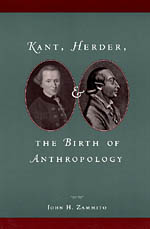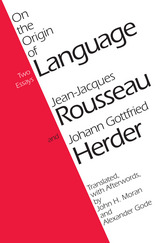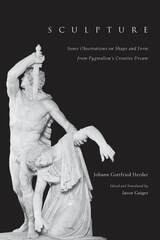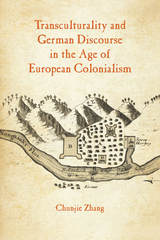4 books about Herder, Johann Gottfried

Kant, Herder, and the Birth of Anthropology
John H. Zammito
University of Chicago Press, 2001
If Kant had never made the "critical turn" of 1773, would he be worth more than a paragraph in the history of philosophy? Most scholars think not. But in this pioneering book, John H. Zammito challenges that view by revealing a precritical Kant who was immensely more influential than the one philosophers think they know. Zammito also reveals Kant's former student and latter-day rival, Johann Herder, to be a much more philosophically interesting thinker than is usually assumed and, in many important respects, historically as influential as Kant.
Relying on previously unexamined sources, Zammito traces Kant's friendship with Herder as well as the personal tensions that destroyed their relationship. From this he shows how two very different philosophers emerged from the same beginnings and how, because of Herder's reformulation of Kant, anthropology was born out of philosophy.
Shedding light on an overlooked period of philosophical development, this book is a major contribution to the history of philosophy and the social sciences, and especially to the history of anthropology.
Relying on previously unexamined sources, Zammito traces Kant's friendship with Herder as well as the personal tensions that destroyed their relationship. From this he shows how two very different philosophers emerged from the same beginnings and how, because of Herder's reformulation of Kant, anthropology was born out of philosophy.
Shedding light on an overlooked period of philosophical development, this book is a major contribution to the history of philosophy and the social sciences, and especially to the history of anthropology.
[more]

On the Origin of Language
Jean-Jacques Rousseau and Johann Gottfried Herder
University of Chicago Press, 1986
This volume combines Rousseau's essay on the origin of diverse languages with Herder's essay on the genesis of the faculty of speech. Rousseau's essay is important to semiotics and critical theory, as it plays a central role in Jacques Derrida's book Of Grammatology, and both essays are valuable historical and philosophical documents.
[more]

Sculpture
Some Observations on Shape and Form from Pygmalion's Creative Dream
Johann Gottfried Herder
University of Chicago Press, 2002
"The eye that gathers impressions is no longer the eye that sees a depiction on a surface; it becomes a hand, the ray of light becomes a finger, and the imagination becomes a form of immediate touching."—Johann Gottfried Herder
Long recognized as one of the most important eighteenth-century works on aesthetics and the visual arts, Johann Gottfried Herder's Plastik (Sculpture, 1778) has never before appeared in a complete English translation. In this landmark essay, Herder combines rationalist and empiricist thought with a wide range of sources—from the classics to Norse legend, Shakespeare to the Bible—to illuminate the ways we experience sculpture.
Standing on the fault line between classicism and romanticism, Herder draws most of his examples from classical sculpture, while nevertheless insisting on the historicity of art and of the senses themselves. Through a detailed analysis of the differences between painting and sculpture, he develops a powerful critique of the dominance of vision both in the appreciation of art and in our everyday apprehension of the world around us. One of the key articulations of the aesthetics of Sturm und Drang, Sculpture is also important as an anticipation of subsequent developments in art theory.
Jason Gaiger's translation of Sculpture includes an extensive introduction to Herder's thought, explanatory notes, and illustrations of all the sculptures discussed in the text.
Long recognized as one of the most important eighteenth-century works on aesthetics and the visual arts, Johann Gottfried Herder's Plastik (Sculpture, 1778) has never before appeared in a complete English translation. In this landmark essay, Herder combines rationalist and empiricist thought with a wide range of sources—from the classics to Norse legend, Shakespeare to the Bible—to illuminate the ways we experience sculpture.
Standing on the fault line between classicism and romanticism, Herder draws most of his examples from classical sculpture, while nevertheless insisting on the historicity of art and of the senses themselves. Through a detailed analysis of the differences between painting and sculpture, he develops a powerful critique of the dominance of vision both in the appreciation of art and in our everyday apprehension of the world around us. One of the key articulations of the aesthetics of Sturm und Drang, Sculpture is also important as an anticipation of subsequent developments in art theory.
Jason Gaiger's translation of Sculpture includes an extensive introduction to Herder's thought, explanatory notes, and illustrations of all the sculptures discussed in the text.
[more]

Transculturality and German Discourse in the Age of European Colonialism
Chunjie Zhang
Northwestern University Press, 2017
In Transculturality and German Discourse in the Age of European Colonialism, Chunjie Zhang examines the South Pacific travel writings of George Forster and Adelbert von Chamisso, literary works by August von Kotzebue and Johann Joachim Campe, Herder’s philosophy of history, and Kant’s theory of geography from the perspective of non-European impact during the age of Europe’s colonial expansion. She explores what these texts show about German and European superiority, the critique of the slave trade, European moral debauchery, acknowledgments of non-European cultural achievements, and sympathy with colonized peoples. Moving beyond the question of empire versus enlightenment, Zhang’s book diligently detects global connections, offering much to scholars of literature, culture, and intellectual history.
[more]
READERS
Browse our collection.
PUBLISHERS
See BiblioVault's publisher services.
STUDENT SERVICES
Files for college accessibility offices.
UChicago Accessibility Resources
home | accessibility | search | about | contact us
BiblioVault ® 2001 - 2024
The University of Chicago Press









